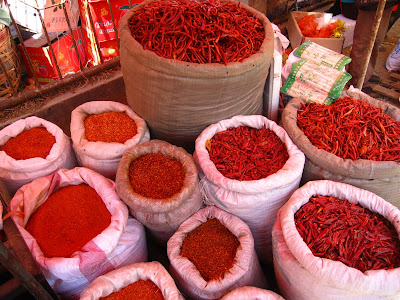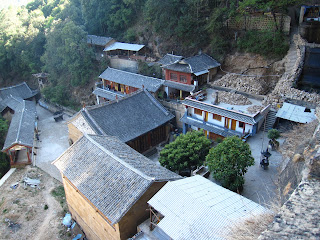On April 27th, the group dispersed after two weeks of traveling in the north, to begin our own field research projects or continue language class. I decided to take a couple of days and travel to southern Xishuangbanna prefecture with my friend Jordan. I was excited to visit this jungle landscape, but the juxtaposition after the northern mountains happened too quickly for me. It was so hot!! After 17hrs on a sleeper bus from Dali (driving for only 14hrs, they let us sleep until 7 in the morning, instead of kicking us off at 4 A.M.), Jordan and I spent the first day exploring Jinghong, the capital city in the Xishuangbanna province.

Xishuangbanna is known for Dai minority culture, famous Pu-er tea plantations, its location, straddling the Mekong, and jungle trekking. Jinghong was a lively city though something felt slightly rough about the culture and the people. The city felt like it was endured, not loved. The people seemed to come from the surrounding rural villages but as usually is the case, economic incentives forced them into the city. Only when you leave Jinghong and venture into the jungle does the area come alive. On the second day, Jordan and I followed a hidden trail through the jungle, climbing through branches and fallen tree trunks, surrounded by the cacophony of hundreds, maybe thousands of fauna. And look what we found:




 Yes, the perfect way to relieve a body caked in sweat- a peaceful waterfall.
Yes, the perfect way to relieve a body caked in sweat- a peaceful waterfall.The next day, we followed the contour of the Mekong to Ganlanba, but to our dismay found an Dai village in the process of transforming into a tourist attraction. Although I was enjoying myself, I decided I was ready to head back to the cool comfort in Kunming, our homebase this semester. (Jordan decided to stay on for another day) That night I took the sleeper bus but when I woke up and walked off the bus, I realized my purse had been razored during the night. At the bottom of the bed is a cove for feet to extend out and I had stashed my purse under my feet. I was banking that no one would reach inside the cove, into my bag, under my feet, under my blanket. But somehow the front and the back of the bag were slashed open. Fortunately, I had slept with a money belt with most of my money, passport, and credit cards. The thief, who I slept next to, only stole my wallet with some money, driver's license, cell phone, and a couple of other small insignificant items, like my chewing gum!? If he had seen my backpack behind my head with electronics, I would be in a different emotional state right now. Lesson learned- thieves are rampant in China, put luggage underneath the bus and sleep cradling your important belongings, even if that means you get half of an already tiny bus bed.
Now I am back in Kunming and I already feel back at home. I decided to spend this last month taking language classes and pursuing my research interest on my own, so therefore unofficially. I would greatly benefit from a two-person language class, for four hours each day for three more weeks. In the afternoons and weekends, I can visit hospitals, universities, and rural doctors to gather field research on the changes in Traditional Chinese medicine. I will be getting the best of both worlds- improving language and conducting research. I am excited to feel focused and hard at work for the last month of this semester.





































































